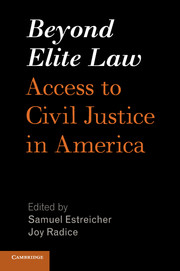Foreword
Published online by Cambridge University Press: 05 May 2016
Summary
The most advanced justice system in the world is a failure if it does not provide justice to the people it is meant to serve. Access to justice is therefore critical.
– Rt. Hon. Beverley McLachlin, Chief Justice of Canada (2007)Where justice is denied, where poverty is enforced, where ignorance prevails, and where any one class is made to feel that society is an organized conspiracy to oppress, rob and degrade them, neither persons nor property will be safe.
– Frederick DouglassNeglected in today's headlines, blogs, and talk radio is a silent shameful crisis inflicting suffering and costing the nation money, legitimacy, and decency. Our justice system has become inaccessible to millions of people who are poor, of modest or even average means. As a result, every day, we violate the “equal justice under law” promise engraved on the front of the grand United States Supreme Court. Americans who cannot afford legal help routinely forfeit basic rights because they cannot afford to enforce them. Inherently wrong and unfair, our practices are also short-sighted. Studies show that each dollar spent on civil legal assistance can save three to six dollars of public funds needed to deal with the consequences.
The problem is not remote. It affects people in every neighborhood. The law does not enforce itself, and so we all suffer when people cannot enforce their legal rights. But of course the brunt of the failure falls on veterans seeking benefits the nation guaranteed, victims of domestic violence needing legal protection, tenants and homeowners asserting their legal rights, and others who cannot find legal help.
This book brings together a dream team of participants, organized by fine editors and introduced by the heroic leaders, retired Chief Justice Wallace Jefferson of the Supreme Court of Texas and Chief Judge Jonathan Lippman of the New York Court of Appeals. The chapters offer vigorous descriptions of the problem, vivid accounts of long-term efforts, and detailed analyses of the multiple elements needed for an effective reform agenda. If scored for degree of difficulty, each of these elements would achieve high numbers.
Describing the scope of the problem is challenging because by its very nature, the problem encompasses people who are not visible to law offices and courts because the individuals lack knowledge and resources to make their way there.
- Type
- Chapter
- Information
- Beyond Elite LawAccess to Civil Justice in America, pp. xv - xviiiPublisher: Cambridge University PressPrint publication year: 2016



